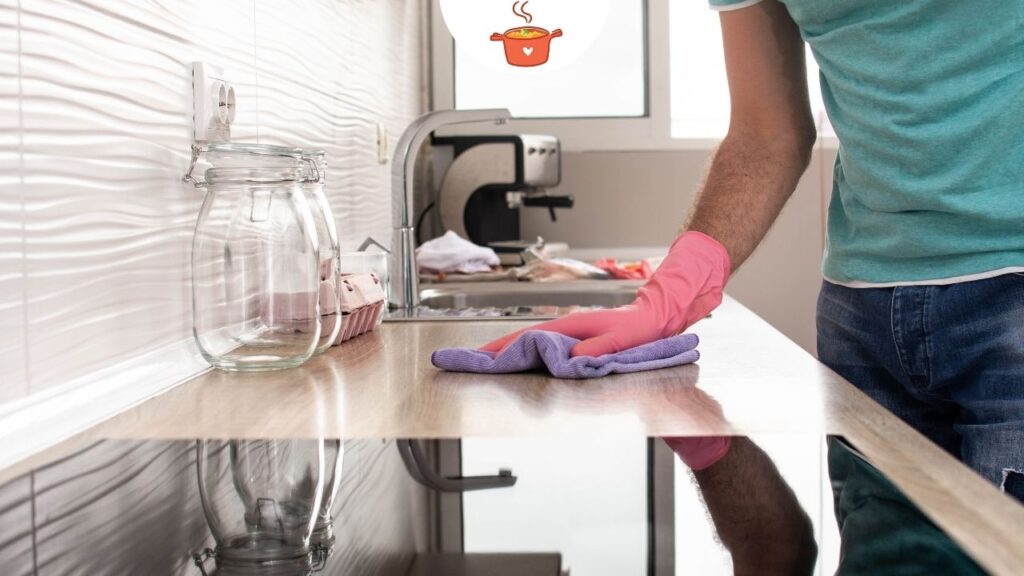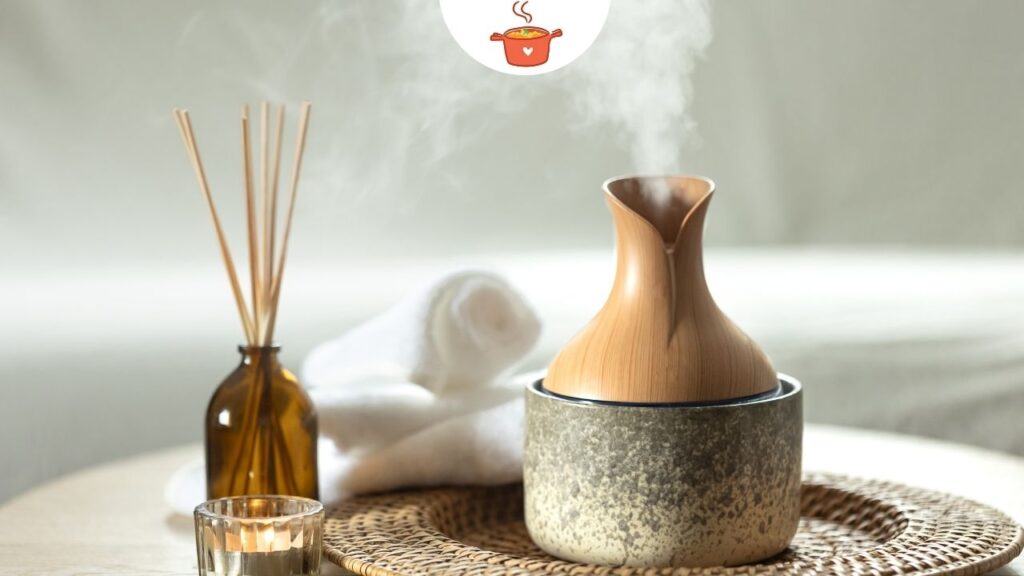
Hey there, friend! Ever walked into your kitchen and been hit with a wave of smells that just won’t quit? I know I have, and let me tell you, it’s not fun. We all love a good home-cooked meal, but sometimes the after-smell can really linger, making the heart of our home feel, well, a little less inviting. After years of battling this myself and experimenting with all sorts of methods, I’ve finally figured out how to remove food smells from kitchen.
In this article, I’ll share some super simple, natural tricks that have worked wonders for me. Ready to make your kitchen smell fresh and clean again? Let’s dive in!
Contents
Understanding Kitchen Odors
So, why do kitchen odors seem to have a life of their own? It’s not just in our heads! Certain foods, especially when cooked at high temperatures, release volatile compounds. Think about the way the smell of frying bacon or sauteed onions can permeate every corner of your home. These smells from grease, spices, and even burnt food can linger because they get trapped in fabrics, settle on surfaces, and even mix into the air. Over time, this can affect the overall air quality of your kitchen, making it feel less fresh and clean, even after you’ve cleaned up. This build-up happens when smells get trapped and mix together, sometimes creating new, unpleasant odors.
Immediate Solutions to Freshen Up the Kitchen Air
Alright, let’s tackle those odors head-on! Here are a few quick fixes to freshen up kitchen air right away:
Ventilation is Key
First things first: get that air moving! This is probably the simplest, yet most effective way to quickly eliminate cooking odors.
- Open Windows: Throw open those windows and let the fresh air in. Even a slight breeze can make a huge difference.
- Use Exhaust Fans: Your exhaust fan is your best friend when cooking. Turn it on before you start cooking and leave it on for a few minutes afterward to help clear the air. This helps circulate air and prevents smells from building up.
Proper ventilation is a game-changer. It’s like hitting the “refresh” button for your kitchen. Plus it helps prevent food smells to mix with each other.
Using Natural Deodorizers
Next up, let’s bring in some natural odor-busting superheroes:
- Baking Soda: This stuff is magic when it comes to absorbing odors. I like to keep an open box of baking soda for kitchen odors in my fridge and pantry. You can also place small bowls around the kitchen while cooking.
- Vinegar: Okay, vinegar has a strong smell itself, but trust me on this one. It’s amazing at neutralizing food smells. Try simmering a small pot of water with a cup of vinegar to neutralize food smells after cooking.
Best Ways to Remove Specific Food Smells
Sometimes, you need to target specific odors. Here’s the breakdown:
Greasy Smells
That lingering smell after frying? We’ve all been there.
- Vinegar Steam: Boil a pot of water with a cup of vinegar for about 15 minutes. The steam helps break down those greasy molecules, helping to remove greasy smells in the air.
- Baking Soda Paste: For greasy surfaces, make a paste of baking soda and water. Gently scrub, then wipe clean.
Stale Cooking Odors
Sometimes, it’s not one particular smell but a general “stale” feeling in the air.
- Essential Oils: A few drops of essential oil in a diffuser can work wonders. I find that citrus scents like lemon and grapefruit are particularly effective to remove stale cooking odors. It’s a great way to get fresh kitchen air without chemicals.
- Simmer Spices: To combat lingering food smells, simmer a pot of water with cinnamon sticks, cloves, and citrus peels. This also will give a natural aromatic environment.
Here is a quick table that summarizes the natural deodorizer recipes, which you can try for yourself:
| Deodorizer | Ingredients | Method | Benefits |
|---|---|---|---|
| Citrus Fresh | Lemon peels, Orange peels, Water | Simmer on the stovetop for 1-2 hours. | Neutralizes odors, leaves a refreshing citrus scent. |
| Spice Delight | Cinnamon sticks, Cloves, Star anise, Water | Simmer on the stovetop for 1-2 hours. | Eliminates stale smells, adds a warm, inviting aroma. |
| Herb Garden | Fresh rosemary sprigs, Fresh thyme sprigs, Water | Simmer on the stovetop for 1-2 hours. | Clears the air, provides a clean, herbal fragrance. |
| Vanilla Essence | Vanilla extract, Water | Add a few drops of vanilla to a bowl of water and let it sit, or simmer gently on the stove. | Masks odors with a sweet, pleasant vanilla scent. |
| Coffee Ground | Used coffee grounds | Place dry, used coffee grounds in a bowl or spread on a tray. | Absorbs and neutralizes strong odors effectively. |
| Baking Soda Boost | Baking soda, A few drops of your favorite essential oil(s) | Mix and place in a small, open container. | Baking soda absorbs odors while essential oil adds a light, pleasant fragrance. |
| Vinegar Solution | White vinegar, Water | Mix equal parts vinegar and water in a spray bottle; spray in the air or on surfaces. | Vinegar neutralizes odors quickly; the vinegar smell dissipates, leaving freshness. |
| Charcoal | Activated charcoal | Place activated charcoal in a bowl or a breathable bag in areas with odors. | Highly effective at absorbing a wide range of odors without adding any scent. |
| Lavender Calm | Dried lavender, Water | Simmer dried lavender on the stovetop or use a diffuser with lavender essential oil. | Lavender not only neutralizes odors but also promotes relaxation with its calming scent. |
| Eucalyptus Cool | Eucalyptus essential oil, Water | Use a diffuser or mix with water in a spray bottle for a refreshing mist. | Eucalyptus offers a strong, clean scent that combats odors and freshens the air, also known for its purifying properties. |
These recipes are not only simple but also a great way to make your kitchen smell wonderful without resorting to artificial air fresheners.
Long-Term Solutions for an Odor-Free Kitchen
Alright, so we’ve talked about quick fixes, but what about keeping your kitchen smelling great all the time? It’s totally doable! Here’s how to make it a reality:

Kitchen Odor Removal Tips
The key to long-term freshness is making some simple habits part of your routine:
- Regular Cleaning: This might seem obvious, but it’s truly the foundation of an odor-free kitchen. Wipe down counters, stovetops, and sinks after each use. A deeper clean weekly, including mopping floors, will prevent food particles and grease from building up and causing odors. Regular cleaning is the most effective kitchen odor removal tip you can follow.
- Air Purifiers: Consider investing in a good quality air purifier. These devices are designed to filter out particles from the air, including odor-causing molecules, giving you clean kitchen air after cooking. They can be especially helpful if you cook frequently or have an open-plan kitchen. They’re a great way to implement odor-free kitchen solutions.
Best Way to Get Rid of Kitchen Smells Over Time
Beyond cleaning, think about how you store food:
- Proper Storage: Use airtight containers for leftovers and strong-smelling ingredients like onions and garlic. This not only keeps food fresh but also contains odors. Think of it as a way to proactively neutralize food smells before they spread. Proper storage is the best way to get rid of kitchen smells in the long run.
Natural Kitchen Deodorizers and Fresheners
Let’s dive deeper into the world of natural ways to keep your kitchen smelling amazing:
How to Use Essential Oils for Kitchen Odors
Essential oils are concentrated plant extracts that pack a powerful aromatic punch. They’re a fantastic alternative to synthetic air fresheners. It is one of the most effective kitchen air fresheners techniques.
- Which Oils to Use: Some of the most effective essential oils for kitchen odors include:
- Lavender: Known for its calming properties, it also has a fresh, clean scent.
- Lemon: A classic for a reason! It’s bright, uplifting, and cuts through odors like a champ.
- Eucalyptus: This one has a strong, invigorating scent that’s great for neutralizing strong odors.
- How to Use Them:
- Diffusers: Electronic diffusers disperse a fine mist of essential oil into the air.
- Room Spray: Mix a few drops of essential oil with water in a spray bottle.
- Simmering: Add essential oils to a pot of simmering water (be careful not to let it boil dry!).
- Direct Application: Place a few drops on cotton balls or in a small dish and place them strategically around your kitchen.
DIY Deodorizer Solutions
Making your own natural deodorizing spray is super easy and satisfying. Here is a simple way how to make your own natural kitchen deodorizer:
Here is a table outlining how to use essential oils effectively for different application methods:
| Method | How to Use | Benefits | Tips |
|---|---|---|---|
| Diffusers | Add water to your diffuser’s reservoir, then add 3-5 drops of essential oil per 100ml of water. Adjust the amount based on your diffuser’s instructions and your scent preference. | Disperses a fine, even mist that freshens the air and provides a consistent aroma. Ideal for large spaces and continuous use. | Clean your diffuser regularly to prevent oil buildup and ensure optimal performance. Start with fewer drops and add more if needed. |
| Room Spray | In a 4 oz (120ml) spray bottle, combine 2 oz (60ml) of distilled water, 1 oz (30ml) of witch hazel or vodka (as a preservative and dispersant), and 20-30 drops of essential oil. Shake well before each use. | Quick and easy way to freshen up a room. Portable and convenient for targeting specific areas. | Use a glass spray bottle as essential oils can degrade plastic over time. Shake well before each use to mix the oil and water. |
| Simmering | Fill a small saucepan with water, add 5-10 drops of essential oil or a combination of oils, and simmer on low heat. Keep an eye on the water level and add more as needed. | Naturally humidifies the air while adding fragrance. Perfect for creating a cozy atmosphere. | Never leave a simmering pot unattended. Use caution around open flames and hot surfaces. |
| Direct Application | Place a few drops of essential oil on cotton balls, fabric scraps, or in a small, open dish. Alternatively, add a few drops to a bowl of baking soda for added odor absorption. | Simple and requires no special equipment. Good for small spaces or for placing in specific areas like cupboards or drawers. | Refresh the oil every few days as the scent fades. Be mindful of placing oils on surfaces that could be damaged by direct contact. |
| Topical (for body) | Dilute essential oils with a carrier oil (like jojoba, almond, or coconut oil) before applying to the skin. A general guideline is 1-2 drops of essential oil per teaspoon of carrier oil. | Allows you to enjoy the fragrance personally. Some oils have therapeutic benefits when applied topically. | Always do a patch test to check for skin sensitivity. Some oils are not suitable for topical use; check safety guidelines. |
| Inhalation | Add a few drops of essential oil to a bowl of hot water, cover your head with a towel, and inhale the steam. Alternatively, add a drop or two to a tissue or handkerchief and inhale deeply. | Direct and effective for respiratory benefits and immediate impact on mood and senses. | Be cautious with hot water to avoid burns. Some oils are very potent; start with a small amount and avoid direct contact with eyes. |
| Bath | Mix 5-10 drops of essential oil with a tablespoon of carrier oil or full-fat milk (to help disperse the oil) and add to a warm bath. | Combines the benefits of aromatherapy with relaxation. Helps to unwind and enjoy the therapeutic properties of the oils. | Ensure the oil is well mixed to avoid direct skin contact with undiluted oil. Test for skin sensitivity before using a new oil. |
| Laundry | Add a few drops of essential oil to a wool dryer ball or a small cloth and toss it in the dryer with your laundry. | Adds a natural fragrance to clothes and linens. Can help to freshen up laundry without synthetic fragrances. | Use sparingly, as too much oil can stain fabrics. Make sure the oil is well absorbed before starting the dryer. |
| Cleaning Products | Add essential oils to homemade cleaning solutions. For example, combine water, vinegar, and a few drops of lemon or tea tree oil for a natural all-purpose cleaner. | Enhances cleaning with natural antiseptic and antibacterial properties. Leaves a fresh scent after cleaning. | Ensure the essential oil is compatible with the cleaning solution and the surfaces you are cleaning. Test in an inconspicuous area first. |
Ingredients:
- 1 cup of distilled water
- 2 tablespoons of witch hazel or vodka (this helps the oil and water mix)
- 20-30 drops of your favorite essential oil(s)
Instructions:
- Combine all ingredients in a spray bottle.
- Shake well before each use.
- Spritz around your kitchen whenever you need a refresh!
It is this simple to make and use.

FAQs: Your Questions About Kitchen Odors Answered!
Here are some common questions I get asked about keeping kitchens smelling fresh and clean:
1. What’s the best way to quickly get rid of a strong cooking smell?
Open your windows and turn on your exhaust fan right away! This helps to move the smelly air out and bring fresh air in. You can also try simmering a pot of water with vinegar to neutralize strong smells, fast.
2. Can baking soda really help with kitchen odors?
Yes, it can! Baking soda is awesome at absorbing smells. Just leave an open box in your fridge or pantry, or place small bowls of it around your kitchen to help keep odors at bay.
3. How do I stop my kitchen from smelling like fried food?
Use your exhaust fan while you’re frying, and try the vinegar trick afterward. Boil a cup of water with a cup of vinegar for 15 minutes to help clear the greasy smell.
4. Are essential oils safe to use in the kitchen?
Yes, they are, as long as you use them safely. Don’t put them on hot surfaces or directly on food. A few drops in a diffuser or a homemade spray are perfect for a fresh scent.
5. How often should I clean my kitchen to prevent odors?
Wipe down counters and your stovetop after each use. Clean your sink daily, too. A deeper clean once a week, including mopping, will help keep odors away.
6. Can I use an air purifier to get rid of kitchen smells?
Yes, you can! Air purifiers can filter out tiny bits in the air that cause smells. They’re great if you cook a lot or have an open kitchen.
7. What is the best natural kitchen deodorizer?
Baking soda and vinegar are great natural options. For a nice smell, try simmering lemon peels, cloves, and cinnamon sticks in water on the stove.
